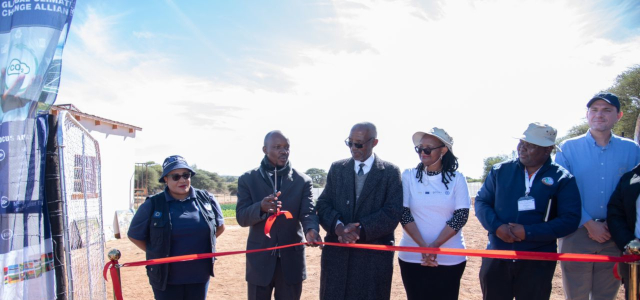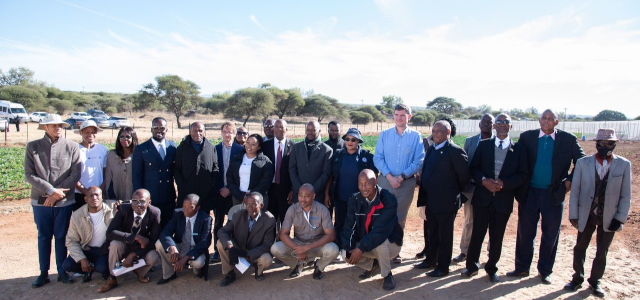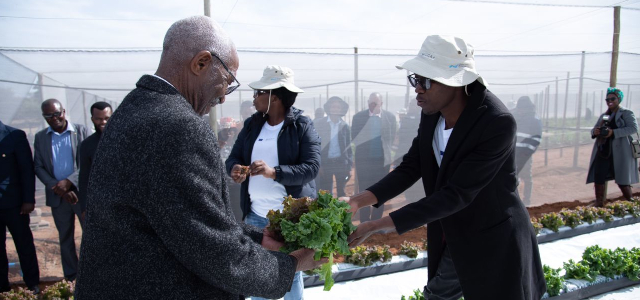The Project has drilled a solar-powered borehole for drip irrigation and hydroponics (growing plants without soil, but only using water and nutrients) for high-value horticultural production, to supplement the livelihoods of over 15,000 people including vulnerable groups, women, and youth in Metsimotlhabe Village. The Department of Water and Sanitation in Botswana will continue to provide technical support to the community.
“Botswana is one of the countries suffering from the impacts of climate change and variability. Rain has become so unpredictable. In addition to the effects of climate change, the community has not been able to benefit from the use of Metsimotlhabe river as it continues to suffer from illegal sand mining. This project has therefore presented an opportunity for the community to learn climate smart agriculture and improve their livelihoods,” explained Mr. Mmolawa.

Mr. Nchidzi Mmolawa, Deputy Permanent Secretary in the Ministry of Lands and Water Affairs, (2nd from left) cuts the ribbon to officially launch the project
The pilot project was being implemented under the Intra African, Caribbean, and Pacific (ACP) Global Climate Change Alliance Plus (GCCA+) programme funded by the European Union, and implemented by the Global Water Partnership Southern Africa, on behalf of SADC.
“The overall objective of the GCCA+ programme is to increase the capabilities of SADC Member States (MS) to mitigate and adapt to the effects of climate change, in support of the achievement of the Regional Indicative Strategic Development Plan (RISDP), Africa Agenda 2063, and Sustainable Development Goals (SDGs); and to have their voice better heard in the international climate change negotiations,” said Ms. Sibongile Mavimbela, Senior Programme Officer, SADC Secretariat.
On its part, the European Union said the USD 9 million Global Climate Change Alliance Plus project in the SADC region has enabled member states to pursue climate resilient projects.
“The GCCA+ project is the EU’s flagship initiative which is helping the world’s most vulnerable countries address climate change. Having started with just four pilot projects in 2008, it has become a major climate initiative that has funded over 80 projects of national, regional, and worldwide scope in Africa, Asia, the Caribbean, and the Pacific,” explained Mr Clément Boutillier, Head of Cooperation, EU.
The Metsimotlhabe Community Trust in Botswana has since begun generating income from their horticultural produce through a contract to supply vegetables to a local supermarket, Sefalana Sarona. Currently, the community is growing rapeseed, lettuce, robot peppers, jalapeños, tomatoes, and cabbages which are estimated to be ready for harvest at the end of July.

Delegates during the handover event at the Metsimothlabe project site
20 members of the Metsimotlhabe Community have also been trained by the Agribusiness Promotion Division from the Ministry of Agriculture and Local Enterprise Authority in vegetable production, irrigation techniques, safe handling of agrochemicals, marketing of horticulture produce, pests & disease control, hydroponics, and record keeping.
“The project is aimed at strengthening the climate resilience of local communities in the Metsimotlhabe River catchment in Botswana through the pilot implementation of climate-resilient Integrated Water Resources Management (IWRM). The GCCA+ project is also supporting Botswana to develop climate adaptation project proposals targeting vertical climate funders to mobilize funds for implementing climate-resilient IWRM investments,” explained Dr. Annah Ndeketeya, AIP SDG and Climate Programme Technical Coordinator, GWPSA.
